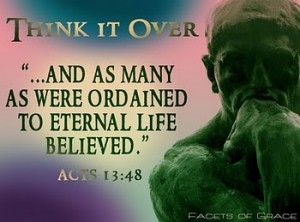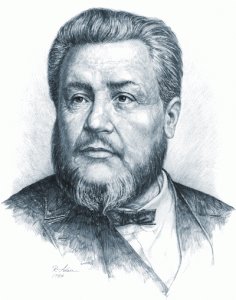 In that same hour he rejoiced in the Holy Spirit and said, “I thank you, Father, Lord of heaven and earth, that you have hidden these things from the wise and understanding and revealed them to little children; yes, Father, for such was your gracious will. All things have been handed over to me by my Father, and no one knows who the Son is except the Father, or who the Father is except the Son and anyone to whom the Son chooses to reveal him.” (Luke 10:21–22)
In that same hour he rejoiced in the Holy Spirit and said, “I thank you, Father, Lord of heaven and earth, that you have hidden these things from the wise and understanding and revealed them to little children; yes, Father, for such was your gracious will. All things have been handed over to me by my Father, and no one knows who the Son is except the Father, or who the Father is except the Son and anyone to whom the Son chooses to reveal him.” (Luke 10:21–22)
This verse is one of the only two places in the Gospels where Jesus is said to rejoice. The seventy disciples have just returned from their preaching tours and reported their success to Jesus.
Luke writes in verse 21: In that same hour Jesus rejoiced in the Holy Spirit and said, “I thank you, Father, Lord of heaven and earth, that you have hidden these things from the wise and understanding and revealed them to babes: yes, Father, for thus it was well–pleasing before you.”
Notice that all three members of the Trinity are rejoicing here: Jesus is rejoicing; but it says he is rejoicing in the Holy Spirit. I take that to mean that the Holy Spirit is filling him and moving him to rejoice. Then at the end of the verse it describes the pleasure of God the Father. The NIV translates it: “Yes, Father, for this was your good pleasure.”
Now what is it that has the whole Trinity rejoicing together in this place? It is the free electing love of God to hide things from the intellectual elite and to reveal them to babes. “I thank you, Father, Lord of heaven and earth, that you have hidden these things from the wise and understanding and revealed them to babes.”
And what is it that the Father hides from some and reveals to others? Luke 10:22 gives the answer: “No one knows who the Son is except the Father.” So what God the Father must reveal is the true spiritual identity of the Son.
When the seventy disciples return from their evangelistic mission and give their report to Jesus, he and the Holy Spirit rejoice that God the Father has chosen, according to his own good pleasure, to reveal the Son to babes and to hide him from the wise.
The point of this is not that there are only certain classes of people who are chosen by God. The point is that God is free to choose the least likely candidates for his grace.
God contradicts what human merit might dictate. He hides from the wise and reveals to the most helpless and unaccomplished.
When Jesus sees the Father freely enlightening and saving people whose only hope is free grace, he exults in the Holy Spirit and takes pleasure in his Father’s election.
– Dr. John Piper

 I want to commend to you a ministry here in the Phoenix area that I had no knowledge of until the last week or so. It is truly exciting to see God raising up young inspiring leaders with such a heart for the Lord and for sound theology, who are seeking to raise up young people who love God with their minds as well as their hearts. Please pray for Pastor Jeff and Pastor Luke and all those at the Apologia Radio ministry. It was my joy and privilege to meet them this week and be interviewed
I want to commend to you a ministry here in the Phoenix area that I had no knowledge of until the last week or so. It is truly exciting to see God raising up young inspiring leaders with such a heart for the Lord and for sound theology, who are seeking to raise up young people who love God with their minds as well as their hearts. Please pray for Pastor Jeff and Pastor Luke and all those at the Apologia Radio ministry. It was my joy and privilege to meet them this week and be interviewed  God could have justly left all mankind to perish in their sin and misery, as He left the angels which kept not their first estate, but according to the good pleasure of His will, He chose in Christ, before the foundation of the world, all whom He purposed to save. “According as he hath chosen us in Him before the foundation of the world, that we should be holy and without blame before Him in love; having predestinated us unto the adoption of children by Jesus Christ to Himself, according to the good pleasure of His will” (Ephesians 1: 4,5). “And we know that all things work together for good to them that love God, to them who are the called according to His purpose. For whom He did foreknow, He also did predestinate to be conformed to the image of His Son, that He might be the first-born among many brethren. Moreover whom He did predestinate, them He also called; and whom He called, them He also justified: and whom He justified them He also glorified” (Romans 8: 28-30). These verses from among many which could be quoted, and the whole scheme of redemption from Genesis to Revelation, afford infallible and unqualified proof that salvation is of free and sovereign grace.
God could have justly left all mankind to perish in their sin and misery, as He left the angels which kept not their first estate, but according to the good pleasure of His will, He chose in Christ, before the foundation of the world, all whom He purposed to save. “According as he hath chosen us in Him before the foundation of the world, that we should be holy and without blame before Him in love; having predestinated us unto the adoption of children by Jesus Christ to Himself, according to the good pleasure of His will” (Ephesians 1: 4,5). “And we know that all things work together for good to them that love God, to them who are the called according to His purpose. For whom He did foreknow, He also did predestinate to be conformed to the image of His Son, that He might be the first-born among many brethren. Moreover whom He did predestinate, them He also called; and whom He called, them He also justified: and whom He justified them He also glorified” (Romans 8: 28-30). These verses from among many which could be quoted, and the whole scheme of redemption from Genesis to Revelation, afford infallible and unqualified proof that salvation is of free and sovereign grace. “I think one of the main reasons we struggle to tell people about Jesus is that deep down we just don’t think it will ever work. We think we’ve already tried to share with people before and nobody was interested. We imagine sharing our faith to be nothing but muscling up our strength to go do our duty and embrace failure. We soldier on, expecting fruitlessness, ‘did it, pastor.’
“I think one of the main reasons we struggle to tell people about Jesus is that deep down we just don’t think it will ever work. We think we’ve already tried to share with people before and nobody was interested. We imagine sharing our faith to be nothing but muscling up our strength to go do our duty and embrace failure. We soldier on, expecting fruitlessness, ‘did it, pastor.’ From “Morning and Evening,” written by C.H. Spurgeon, revised and updated by
From “Morning and Evening,” written by C.H. Spurgeon, revised and updated by